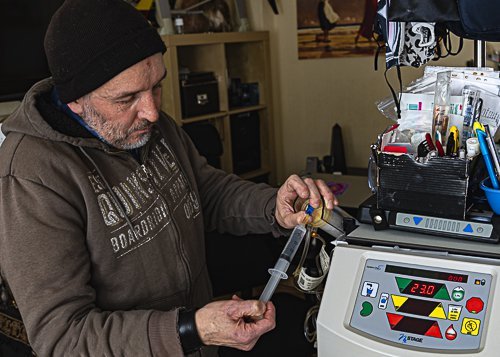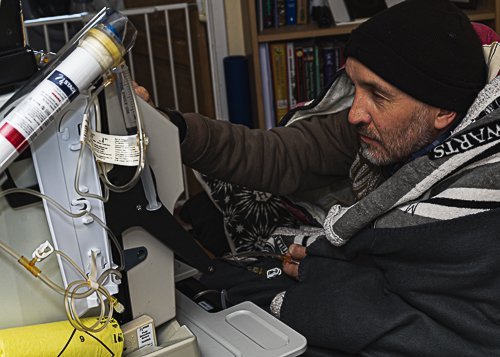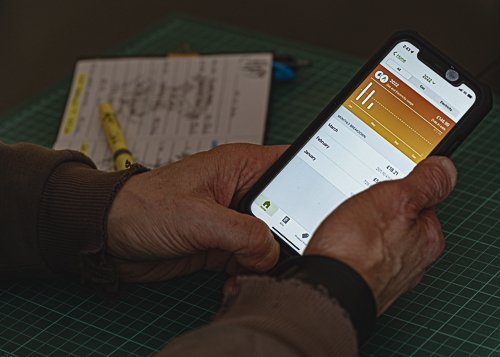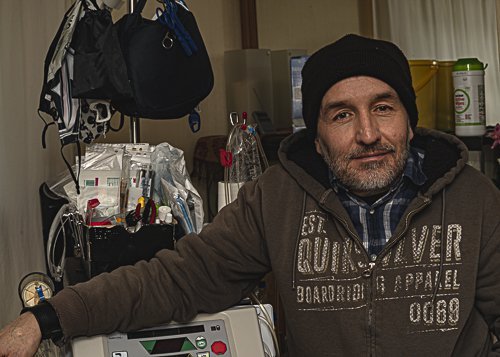"Money is tight for our family, as it is for many right now. But my stark reality is that it’s costing me more and more just to stay alive.
"Diagnosed with glomerulonephritis as a teenager, my kidneys can’t remove toxic waste and fluid from my body. So dialysis at home in my living room five nights a week does that job instead. As I can’t afford to heat my home, I’m absolutely freezing during my sessions – and that’s directly affected whether my life-saving dialysis treatment works or not.

"My living room is so cold it might as well be outside"
"Our energy bills are set to rise astronomically. Our monthly payment is currently £80, but we’ve been quoted a whopping £300 per month as a fixed price plan, which would more than triple our bill.
"Like many families facing a cost of living crisis, we’ve already tried to shave off every expense. Recently, the only remaining option was to turn the gas central heating right down to below 14°C. Effectively, turning it off. But there was a serious consequence to this: my dialysis machine stopped working.
"Basically, my living room became too cold for the special liquid – dialysate – to flow through the machine and pull toxins from my blood. My machine sounded a noisy alarm all through the night.
"When you dialyse, it’s common to feel cold as your blood is returned to you once it’s made its way through the machine. But the cold I felt was like nothing else. I realised that the blood leaving my body to go into the machine was taking all my body heat with it – and as I was in a cold room I couldn’t warm up again.
"With no dialysis, zero sleep and hardly any body warmth, I called the dialysis unit helpline. As heating the dialysate fluid was probably cheaper than heating the room, they suggested turning up the dialysate temperature to maximum instead. Success: the machine started working again. And when I dialyse now, I’m not as uncomfortably cold.
"But as the room is as freezing as ever I still need lots of extra layers. At night I’m in thermal tops, multiple t-shirts, jogging bottoms and sometimes even a hat. Plus I pile three blankets and a bulky sleeping bag over me. I probably look like a homeless person sleeping on the street.
"My living room is so cold it might as well be outside. The cold permeates my days, too. The only time I feel warm in my own skin is when I drive to pick up Rosie from school."

"I’m reimbursed a fraction of what it costs to run the machine"
"Things are a struggle despite Sam, my wife, working full time as an NHS midwife and taking on all possible extra shifts. Unfortunately I can’t work as I’m classed as disabled, and am on benefits. We’ve asked for financial help from family and have sold unwanted items to raise funds.
"But there’s no escaping the fact that our energy costs will rise even higher – and I’m reimbursed a fraction of the amount it costs to run my machine at home.
"Rising bills mean the cost of dialysing is set to rise to £30 per month. Yet I’m currently reimbursed just £24.70 – per quarter. When we first researched haemodialysis at home nine years ago, we were told that it was good for my renal unit because it’s far cheaper than in-centre dialysis. However it now feels like we’re having to pay to keep me alive."

"It shouldn’t be up to charities to help disabled people survive"
"Despite my struggles, in many ways I feel fortunate. For starters, we have a happy family and a roof over our heads. There’s an option to have haemodialysis at my renal unit but the timings would probably prevent me driving Rosie to school. It means a lot to me that I can do that so I don’t want to give that up.
"Those of us with disabilities who use medical equipment at home use far more power than most. And I know other vulnerable kidney patients will be in a similar or worse situation – with even more reaching crisis point soon.
"What happens if kidney patients are pushed into poverty and can’t pay their energy bills? Will they be too scared to use any gas so end up freezing? Worst still, will their electricity be cut off mid-dialysis?
"Kidney Care is supporting people in my situation, offering grants to help us pay our energy bills. This help could be life-saving. But it shouldn’t be up to charities to help disabled people survive, and some will feel pushed to the edge.
"Rising fuel costs are making just staying alive even harder and it feels like we’re being priced out of existence."
